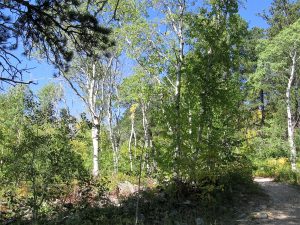 Psalm 18:7-19
Psalm 18:7-19
The earth trembled and quaked, and the foundations of the mountains shook; they trembled because he was angry (18:7 NIV).
In this psalm, David taught his people to sing with him about God’s deliverance of him, so that they might have confidence that God would bring full deliverance one day through the Lord’s Anointed, the Messiah. He previously declared the desperate situation he was in. Next, he pointed out in marvelous poetic pictures God acting to rescue him.
We gain our identity from big events in our lives. In birth, we enter this world and a family. That family gives us our name and forms our basic ideas, expectations, habits, and morals. It can take our God-given personality and either nurture it or twist it. When a man and a woman join in marriage, they give what they are to each other, and they form a new family identity, which in turn will nurture the new partners or twist them.
God gives us a new identity when he saves us and makes us part of our people. Our new identity comes from the event of redemption. God intends it to form us increasingly into his image, as we walk with each other in newness of life. Sadly, what we learn and experience with others in a local fellowship of believers can distort us from what our likeness to God ought to be. If you’re with people that are greedy or angry or judgmental or shallow, you will be influenced by their attitudes and behavior. In this new covenant age, the redemptive event is what Jesus Christ accomplished on the cross and his resurrection. We ought to be gospel formed people. Our identity then influences how we think and act: You are not your own, for you were bought at a price. So glorify God with your body (1 Corinthians 6:19b-20 CSB). Since, then, you have been raised with Christ, set your hearts on things above, where Christ is, seated at the right hand of God (Colossians 3:1 NIV). The truth of the gospel sets the direction of our way of life.
In the old covenant, the event of redemption was the exodus from Egypt, including the crossing of the Red Sea and the receiving of the law covenant at Sinai. Much of what we hear about the old covenant people Israel in the Prophets and the Writings flows from the exodus. It gave them their identity. They were a physically redeemed people. Why did I go into this matter? It matters because David wrote about his deliverance from the hand of all his enemies and from the hand of Saul (see the heading of this psalm) through the “lenses” of the exodus. He used the language of the crossing of the sea and the giving of the law to talk about how the Lord rescued him.
We can speak of poetic language and metaphors, but this is more than that. It is personal and redemptive. David understood that the God of the exodus and Sinai was the Lord who delivered him. It was the God who redeemed his people from their enemy Egypt who delivered David from his enemies.
In our next post on this psalm, we want to look at the imagery that David used from the exodus and Sinai. But at this point, let us examine ourselves. Do we consciously think of ourselves as redeemed people? Does the truth of the gospel events permeate our world and life view? Do we act as people set free by Christ? We have a lot to glory in. Let us move forward with the joy of redeemed people. But the redeemed shall walk there. And the ransomed of the Lord shall return and come to Zion with singing; everlasting joy shall be upon their heads; they shall obtain gladness and joy, and sorrow and sighing shall flee away (Isaiah 35:9b-10 ESV).
Grace and peace, David

 Ruth 1:16-18
Ruth 1:16-18